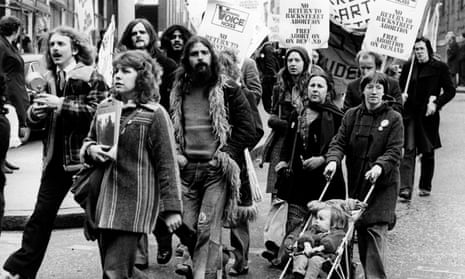Today is the 50th anniversary of the 1967 Abortion Act, a groundbreaking piece of legislation that allowed doctors in Great Britain to perform abortions lawfully so long as certain conditions were met. Doctors were given the responsibility of deciding if a woman met the conditions laid down by the act. The act has achieved its objective of eliminating deaths from illegal abortion and this fact – and the relief of millions of women who faced an unwanted pregnancy – should be celebrated.
The devolved government of Northern Ireland, however, did not pass the legislation. In November 2015, a high court judge ruled that the government’s refusal to countenance termination was an abuse of women’s human rights. The Northern Irish appeal court ruled this year that it was up to Stormont (currently suspended) to legislate to remedy this abuse of women – despite the fact that the only thing that unites the parties is their opposition to abortion.
However, abortion remains a crime under the 1861 Offences Against the Person Act (itself a modified version of the 1803 act which made abortion unlawful for the first time; before that it was a misdemeanour and dealt with by the church), and two women in the past five years in England have been jailed for taking abortion pills very late in pregnancy using the 1861 Act – cases that received scant attention in the media.
Two factors led to the public becoming receptive to abortion law reform. Firstly, abortion became the leading cause of maternal deaths in the decade before the 1967 act was passed, with between 50 and 60 women each year dying of unsafe abortion. Secondly, there was the thalidomide disaster. In 1962 it was revealed that thousands of children had been born with severe abnormalities after their pregnant mothers had taken the drug, which was prescribed for morning sickness and sleeplessness. Some abortions had been allowed in very limited circumstances – to save the woman’s life or preserve her health – following the Bourne judgement of 1938, which allowed a pregnancy to be terminated if it ‘‘make the woman a physical or mental wreck”. But bearing a foetus with a severe or fatal anomaly did not fit these criteria, so even women who knew their child might be severely affected by thalidomide could not ask for the pregnancy to be terminated.
The Abortion Law Reform Association sent a questionnaire to all prospective parliamentary candidates, and David Steel ticked the box asking if he would consider introducing a bill to reform abortion law, should he be elected. In 1965 he was, and he came third in the private member’s bill ballot. With the help of the whips and government allowing time, the bill finally passed after an all-night sitting on 27 October 1967.
The bill came under attack almost immediately, and this has continued to the present day with 50 attempts to restrict it using early day motions, 10-minute rule bills and Westminster Hall debates. It is presented in the media as highly controversial, but its positive effects are rarely mentioned. The Society for the Protection of Unborn Children was launched in January of 1967 by gynaecologists including Prof Hugh McLaren, who made sure that the Birmingham region had the lowest proportion of NHS-provided abortions.
The anti-choice organisations Society for the Protection of Unborn Children, and Life (which started in 1970) are well-funded and wield disproportionate influence. Polls have shown that few people realise that abortion is still a crime; 70-80% think the woman should make the decision in association with her doctor, and less than 10% accept the organisations’ position that life begins at conception and that all abortion is wrong.
What is needed now is that abortion be removed from the criminal code in the UK and treated like any other medical procedure, subject to regulation and ethical standards laid down and enforced by the GMC. In the 21st century women should not require the authorisation of two doctors – they are adult autonomous beings perfectly capable of taking decisions about their own bodies.










